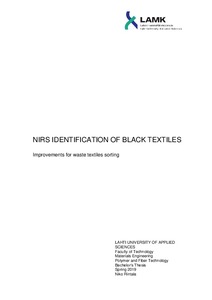The Role of Project Management for Improving Sustainability in the Textile Industry of Bangladesh
Islam, Md Ariful (2025)
Islam, Md Ariful
2025
All rights reserved. This publication is copyrighted. You may download, display and print it for Your own personal use. Commercial use is prohibited.
Julkaisun pysyvä osoite on
https://urn.fi/URN:NBN:fi:amk-2025060520551
https://urn.fi/URN:NBN:fi:amk-2025060520551
Tiivistelmä
The Bangladesh textile industry contributes immensely to the economy of Bangladesh but is under more pressure to go for sustainability due to environmental, social, and economic needs. The objective of this study is to analyse the current sustainability in the industry, the demand for sustainable project management (SPM), and the mechanism through which SPM can be applied practically. The research is based on project management, sustainability, and industrial change theories, and is carried out through qualitative approaches, semi-structured interviewing, and documentation analysis of two textile firms.
The findings recognize that while awareness about sustainability is in creasing, actual implementation remains low—particularly in small and medium enterprises. The key constraints are operational high costs, absence of adequate training, weak policy environments, and absence of digital platforms. The study establishes that SPM's effective usage through government incentives and capacity building is essential to ensuring long-term viability of the textile sector.
The findings recognize that while awareness about sustainability is in creasing, actual implementation remains low—particularly in small and medium enterprises. The key constraints are operational high costs, absence of adequate training, weak policy environments, and absence of digital platforms. The study establishes that SPM's effective usage through government incentives and capacity building is essential to ensuring long-term viability of the textile sector.
Kokoelmat
Samankaltainen aineisto
Näytetään aineisto, joilla on samankaltaisia nimekkeitä, tekijöitä tai asiasanoja.
-
Pakistani and Finnish textile industry and risk factors for Pakistani textile industry : Comparison of textile industries in countries, financial performance and survey report of risk factors for Pakistani textile industry
Zeeshan, Muhammad (2020)The main aim of this thesis is to define the overall history and the present condition of textile industries of Pakistan and Finland, and what risk factors are affecting to Pakistani textile industry. Textile sector is ...Rajattu käyttöoikeus / Restricted access / Tillgången är begränsad -
NIRS identification of black textiles : Improvements for waste textiles sorting
Rintala, Niko (2019)Near infrared spectrometry (NIRS) can be harnessed to identify organic compounds by building libraries of reference spectra with validated samples. In Lahti University of Applied Sciences (LAMK), NIRS is utilized in a ... -
Foreign Direct Investment on Bangladeshi Garments and textiles Sector : An overview of the foreign ownership in Bangladesh Garments and textiles
Hossain, Razib (Seinäjoen ammattikorkeakoulu, 2015)Foreign direct investment (FDI) is a potent weapon of economic development, especially in the current global context, which enables a capital-poor country like Bangladesh to help integrate its domestic economy with the ...


